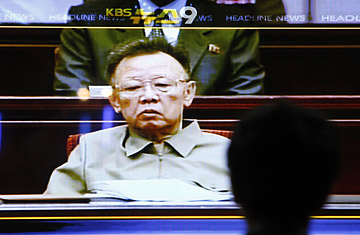
A man watches a TV news broadcast about North Korean leader Kim Jong Il at the Seoul railway station on July 8
(2 of 2)
Then there's the nature of the attacks: crude and essentially harmless. Cyberexperts call them denial-of-service (DOS) attacks, because they do no more harm than slow down or temporarily shut down networks. No sensitive government network was affected: the hackers (or lone hacker, since this could easily be the work of one person) only went after unrestricted, so-called public-facing sites. The assumption among some cyberexperts is that such unsophisticated attacks must come from an unsophisticated source.
And despite its backward image, the so-called Hermit Kingdom could have pulled it off. Though Pyongyang may have few resources, it spends a lot of them on technology: computer studies are an important part of school and university curriculums. Stratfor's Baker points out that North Korea has become a major player in the computer-animation industry, which means it has banks of highly sophisticated computers, and people who know how to use them. North Korean hackers have in the past, for instance, launched more sophisticated attacks that actually penetrated South Korean sites.
But if North Korea isn't behind the attacks, who else could it be? China is one obvious suspect. Although Beijing bristles at the accusation, U.S. officials say Chinese hackers have repeatedly attacked American networks, including the nation's power grid. The People's Liberation Army takes cyberwarfare very seriously, but China also has legions of freelance hackers, who attack global networks for fun. Russia, too, has both state and private hacking capabilities.
Another country bristling with freelance hackers happens to be South Korea. Hackers in Seoul have been known to attack U.S. and international networks. Several U.S. servers were hit after the disqualification of a South Korean skater at the Salt Lake City Winter Olympics allowed Apollo Ono to win the 1,500-m speedskating event.
There's also the possibility that the perpetrator is much closer to home — some hacker testing his skills from a cybercafé in Washington. Experts don't rule that out, but say it's unlikely.
Spokespersons for both the White House and the Department of Homeland Security point out that the attacks were ultimately in vain: the affected sites were repaired with relative ease. Officials say there are literally millions of such attacks on government sites every day.
Even so, says Meyerrose, the attacks should serve as a caution. "The fact that some sites slowed, some crashed and others were unaffected tells us that we need consistent security systems across the government," he says. "At the end of the day, it's not about where they came from, but what you do to prevent them from happening again."
